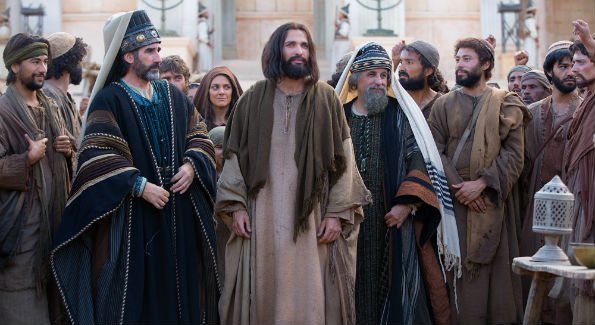National Geographic’s “Killing Jesus” Shows Politics Behind Crucifixion
By Kiki Burger
Backstabbing. Betrayal. No good choices. Lying about your beliefs. Standing on principle. No, we’re not talking about the politics of the nation’s capital, but the life of one of history’s most important figures: Jesus Christ. Washington’s historical giant National Geographic tackles themes many Washingtonians are all too familiar with in its latest film, “Killing Jesus.
”
Intended to be as historically accurate as possible, “Killing Jesus” gives us a glimpse of what daily life was like for all the key players involved in the years leading up to the Crucifixion. Unlike prior films on the “King of the Jews,” “Killing Jesus”—airing this Sunday on the National Geographic Channel—doesn’t present an ephemeral, God-like Jesus doing a beautiful miracle in every scene. No, more like an episode of “House of Cards,” the film gives viewers the real, grittiness of the day by highlighting the power hungry king and his conniving queen who are determined to stop this upstart named Jesus; a one-time ally flipping sides for 30 pieces of silver; and the governor with the power to stop the horror, but doesn’t, and tries to put the blame on others. (Actually, it does sound a lot like Washington on some days.
)
Perhaps an emphasis on the political temperature of the time shouldn’t be a surprise considering the film’s executive producer: Bill O’Reilly. “Killing Jesus” is the third installment of the cable network’s “Killing” series based on O’Reilly’s series of books on that concept.
Of course, politics were no surprise in the network’s first two takes on his books, Killing Lincoln and Killing Kennedy.
Actor Haaz Sleiman, who plays the role of Jesus, believes O’Reilly is a perfect person to present such themes as it takes opinions to create a better world, which is, after all, what the arts are all about.
“I think as long as we end up respecting one another for our differences, then that’s great,” he told Washington Life, fittingly, over a glass of red wine at the Sun Valley Film Festival in Idaho, after the film’s world premiere earlier this month. “We need to have different opinions and we need to speak openly about them because I think for a civilized nation or society, that is the basis for it to be able to give your opinion even it is different from someone else it is healthy.
Even if you disagree. You want that in a marriage, you want that in a relationship, you want that in a society.
It’s no different.”
Sleiman embodied these differences not just in the character he played, but what he was able to bring to it his based on his personal experience. Born and raised Muslim in Lebanon, where Arabic was his first language, he now found himself playing the Jew who founded Christianity.
“I think what it does is highlight the truth about one thing: all those three religions essentially have the same essence and the same god,” he said. “That’s what I think is so beautiful…[the film is] an opportunity to bring more people together from all different religions whether it be Jews, Christians, Muslims, that’s what I feel like me playing that role represents.”
While Sleiman in person lacks any of the personal characteristics found in a Frank Underwood— “love,” “respect” and “embracing humanity” were phrases frequently repeated, and he even called Washington “charming”—he does have some tricks up his sleeve.
When asked if he was political, Sleiman paused, and smiled, saying carefully, “Oh, I have opinions, I am very opinionated.”

